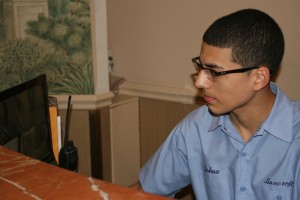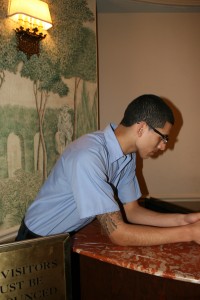
Josh Penafiel, 20, sat behind a marble counter in the lobby of The Bancroft apartment building on the Upper West Side. Amid the ornate wallpaper and gilded sconces, he signed for packages and played peekaboo with the babies bouncing by in their Baby Bjorns.
The young man from Queens knows this concierge gig is a good job. The pay is $20 an hour, plus $5,000 to $7,000 in tips at Christmas. “One guy gives me my tips in two dollar bills,” Penafiel said with a smile as he accepted a hanger full of dry cleaning from a delivery man.
Penafiel’s father is a doorman, and his older brother is a doorman. But he had hoped to avoid the family business, dreaming instead of a career as a police officer or detective. Still, without a high school diploma, he doesn’t have many options.
Penafiel’s journey to his current post began when the city decided to close down his East New York high school for persistently low performance — part of Mayor Michael Bloomberg’s plan to shutter struggling schools and replace them with new ones. At the time, Penafiel was a freshman and on the honor roll with perfect attendance.
Three years later, he had more than enough credits to graduate, but failed to pass the required Regents exams. He said he did not so much leave school as get left behind. “Nobody pointed me in the right direction so I had to figure out what to do on my own,” he said.
Now Penafiel hopes he can undo the damage by passing the tests this June and finally getting his diploma. Almost 21, and about to age out of the public school system, time is running out.
—
In spring 2007, Penafiel joined approximately 80,000 other rising freshmen and applied to a handful of the city’s public high schools. He only got into one, the EBC/East New York High School for Public Policy and the Law. It wasn’t his first choice, not even close. “I thought Brooklyn, eh,” he said. Then again, it was his only option.
Penafiel’s new school was just over a decade old, but it already had a rich and unusual history. The East Brooklyn Congregations, a coalition of religious groups and neighborhood activists, had opened the school in an old sewing machine factory on Herkimer Street in 1993, shortly after two students were shot in the hallway of Thomas Jefferson High School just a few blocks away. Back then, East New York was rife with guns and drugs. Members of East Brooklyn Congregations had hoped to beat back the violence by creating a small, neighborhood-based school where students could develop solutions to the community’s problems and put them into action.
For a while, the new school appeared to be meeting its mission. Two community organizers from the East Brooklyn Congregations maintained offices on school grounds. Students held mock trials in a wood-paneled courtroom at the rear of the building, and the school maintained strong partnerships with the New York Police Department and John Jay College of Criminal Justice.
But by the beginning of the next decade, the school was struggling. In 2004, a new principal was accused of reading the names of failing students over the school’s loudspeaker. Tensions escalated between the principal and EBC, and in 2006 the non-profit group decided to cut ties to the school. After that, former EBC teacher Jeff Kaufman said, the school declined rapidly.
Kids called the principal “Macy’s Bag” because she spent so much time shopping, and fights often erupted in the hallways. When Penafiel arrived, only about 50 percent of EBC seniors graduated and attendance hovered below 70 percent. The focus on public safety and the law had nearly disappeared. Still, in an annual report, Department of Education evaluators called the school “proficient” overall.
—
Penafiel kept his head down and did his work, anxious to graduate. “I knew I had to get it over with,” he said. “Everything was going smooth.” According to Kaufman, all the school needed was a change in leadership and some “forward thinking” administrators.
Instead, the city decided to close it.
The winter of Penafiel’s freshman year officials announced plans to phase out EBC by attrition as each class graduated. It was among the first of the 164 schools closed during the Bloomberg Administration, and active parents quickly scouted alternative options for their children. The rest of the kids stayed behind as the Department of Education opened up a new transfer school called Aspirations Diploma Plus in the same building.

At first, the two schools shared the space equally. Then, as EBC shrank, Aspirations began accumulating more and more real estate. By the time Penafiel was a senior, only about 30 of his classmates came to school every day, occupying a small corner of the building while Aspirations took possession of the library, lunchroom and gym. “The first thing that we noticed was all the money than came into Aspirations,” said Kaufman, who was hired to teach at the new school. “Smart boards instead of chalk boards. A 60-inch TV in the library. The UPS man was making four trips a day.”
Perhaps in response to the changing atmosphere, perhaps for his own reasons, Penafiel began acting out. “You could get up and walk out,” he said. “We’d go to the hallway. We had hour-long bathroom breaks. Summer came and a lot of kids were going to the beach. They would try to call my parents. But that wouldn’t do anything.” Eventually, Penafiel said, he just gave up. “That’s what happened to a lot of kids, since they weren’t being pushed, they weren’t being motivated,” he said.
By the end of his senior year, Penafiel had more than the requisite number of credits to graduate, but he hadn’t passed his Regents exams in Global History and U.S. History, which meant he couldn’t get his diploma. He could have gone to the Young Adult Borough Center at Jefferson High School down the street, but he decided not to, opting instead to focus on his job at a condo building in Manhattan.
Penafiel went to his senior prom, a boat ride to the Statue of Liberty, but he didn’t go to graduation. “What’s the point,” he remembered thinking at the time. “I didn’t want to go see everyone graduating and moving on and get that left-behind feeling.” Most of his classmates did receive their diplomas, although a few, like him, fell through the cracks, joining the army, or landing behind a cash register at the local corner store.
—
Proponents of school closings argue that the slate of small, new schools are simply better than their larger, older counterparts, and in 2010, the nonpartisan research group Manpower Demonstration Research Corporation found that the new schools yielded higher graduation rates than the older ones. But that same year, the Annenberg Institute for School Reform at Brown University also found that the new schools, even though they tend to be located in disadvantaged communities, enroll fewer students from high-poverty backgrounds than the larger schools, meaning that students like Penafiel have been less likely to benefit from the new reforms than his more affluent peers.
Meanwhile, as a high school dropout, Penafiel’s prospects continue to be much dimmer than those of his classmates who graduated. According to the Center for Public Education, high school graduates — even those who graduate late — are more likely to go on to college, hold down full-time jobs, vote and even exercise than their peers who earn only a GED.
Penafiel said he’s watching the phenomenon unfold firsthand. His wages are stuck at $20 per hour and he has decided he wants more from his career. He hopes to go to college, and eventually realize his original dream of being a police officer. “My grades aren’t too great,” he said. “So maybe I’ll go to Borough of Manhattan Community College or La Guardia.” But first he needs to get his high school diploma.
—
Last year, Penafiel began lobbying Department of Education staff to allow him to re-enroll in high school so he could get help preparing for his Regents exams. He made calls to the agency’s main office, and even showed up in person to make his case. “They looked at me like I have two heads,” he said.
Eventually he got permission from Shermila Bharat, the principal at Aspirations, to sit in on history classes with his old teacher Jeff Kaufman. Now, Kaufman and Penafiel spend a couple of hours most weekdays going over key concepts that could appear on the Regents exam next month.
“How we doing?” Kaufman asked one morning as Penafiel sat in a corner of his former teacher’s classroom, scribbling down some answers to an essay question about geography’s influence on the Civil War. Penafiel had some ideas; he knew that the war was fought over geographical lines, and that the southern climate influenced the emphasis on agriculture, which in turn spurred slavery. But he struggled to come up with other examples, and his sentences were choppy and incomplete. “I can do better,” he said, pocketing his looseleaf paper. “I know I can.”
Kaufman urged him to keep up. “If I could take this test for you, I would,” he said. But Penafiel said he’s determined to pass the Regents this time. “I’m going to pass,” he said. “I’m going to push myself to pass.”



